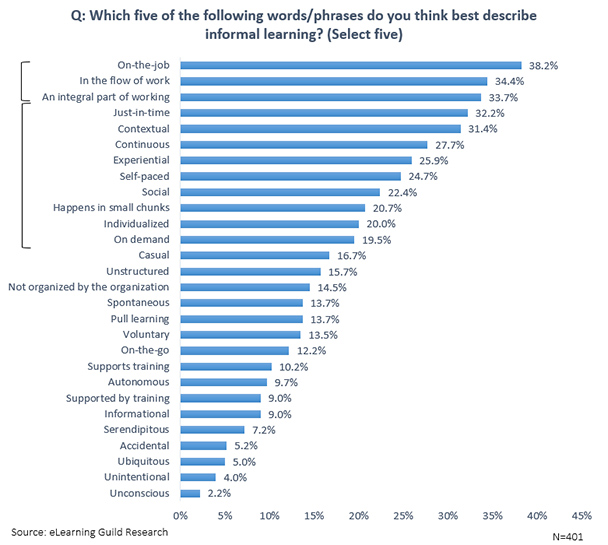The Guild’s newest research report, Informal Learning Takes Off, shows that when experts use the term informal learning, they don’t mean quite the same thing as eLearning and learning practitioners do. That’s according to the results of the April 2014 eLearning Guild informal learning survey, with 402 respondents. The survey results showed a wide understanding and interpretation of what the term informal learning means. For respondents of the survey, informal learning mostly means a broad range of new approaches to workplace learning, from non-traditional approaches to training to autonomous, unplanned individual and team learning.
This survey research by Jane Hart is a follow-on from the Guild’s 2012 research report Smart Companies Support Informal Learning, which describes existing research about informal learning. The 2012 report used this definition of informal learning: “Informal learning includes situations where the learner determines some combination of the process, location, purpose, and content and may not even be aware that instruction has occurred.”
That previous research report stated that the vast majority of learning in the workplace happens not in formal training environments but in informal settings. When asked, many workers said that informal workplace learning is far more important to them than workplace training programs. The report also showed that in informal learning, sometimes you know you are learning and sometimes you don’t know, because you may not be actually setting out to learn. For example, when talking with colleagues, they may tell you things that you didn’t already know, things that you may use later.
In this survey, just under 40% of participants worked in small organizations with fewer than 500 employees, while around 45% worked in medium-sized organizations with between 501 and 25,000 employees, and 15% worked in large organizations with more than 25,000 employees.
The first question asked respondents to select five words or phrases they felt best described the term “informal learning.” The purpose of this question was to see if respondents understood the term informal learning similarly to how experts understand it. Figure 1 shows respondent responses.
 Figure 1: Words and phrases to describe informal learning
Figure 1: Words and phrases to describe informal learning
The three words or phrases that were chosen most frequently by respondents included: On-the-job, In the flow of work, and An integral part of working. This shows that respondents believe a dominant characteristic of informal learning is that it takes place out of the classroom, inserted in the everyday workflow.
The next 10 most-selected words or phrases were: Just in time, Contextual, Continuous, Experiential, Self-paced, Social, Happens in small chunks, Individualized, On demand, and Casual. If you look at the terms in Figure 1 below these terms, however, you will find terms that are more typically synonymous with the term informal learning: Autonomous, Serendipitous, Accidental, Ubiquitous, Unintentional, and Unconscious (all terms that informal learning experts tell us are key features of informal learning). The previous 10 terms that respondents selected are more appropriately cited as less formal learning concepts.
Smart Companies Support Informal Learning describes the research showing how most learning in the workplace is informal, so it’s becoming increasingly important that L&D and eLearning professionals know what it is and how to best support it. Although the myriad examples provided by respondents in the new research report, Informal Learning Takes Off, are examples of less formal training rather than truly informal learning, they show a shift to some innovative approaches that you may want to take note of and even replicate.
The new report also shows how Guild members are thinking about different informal learning approaches, why they are getting involved with informal learning, and how they are evaluating these approaches.


